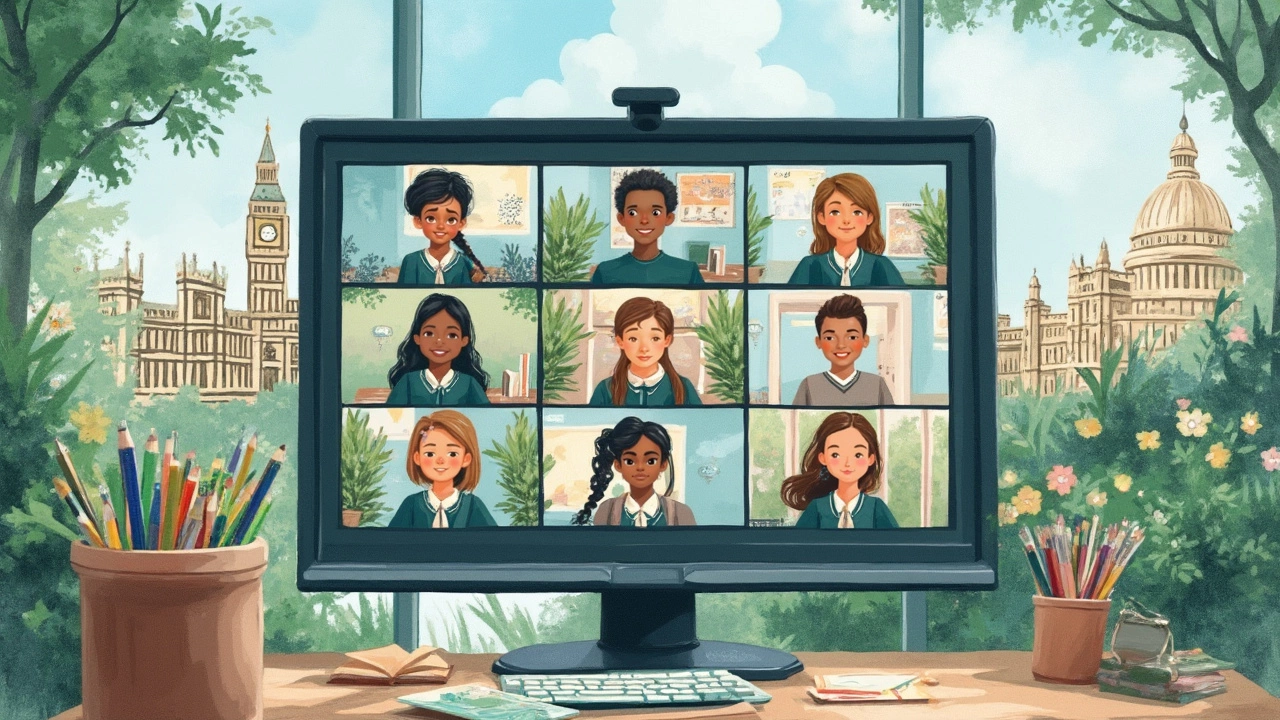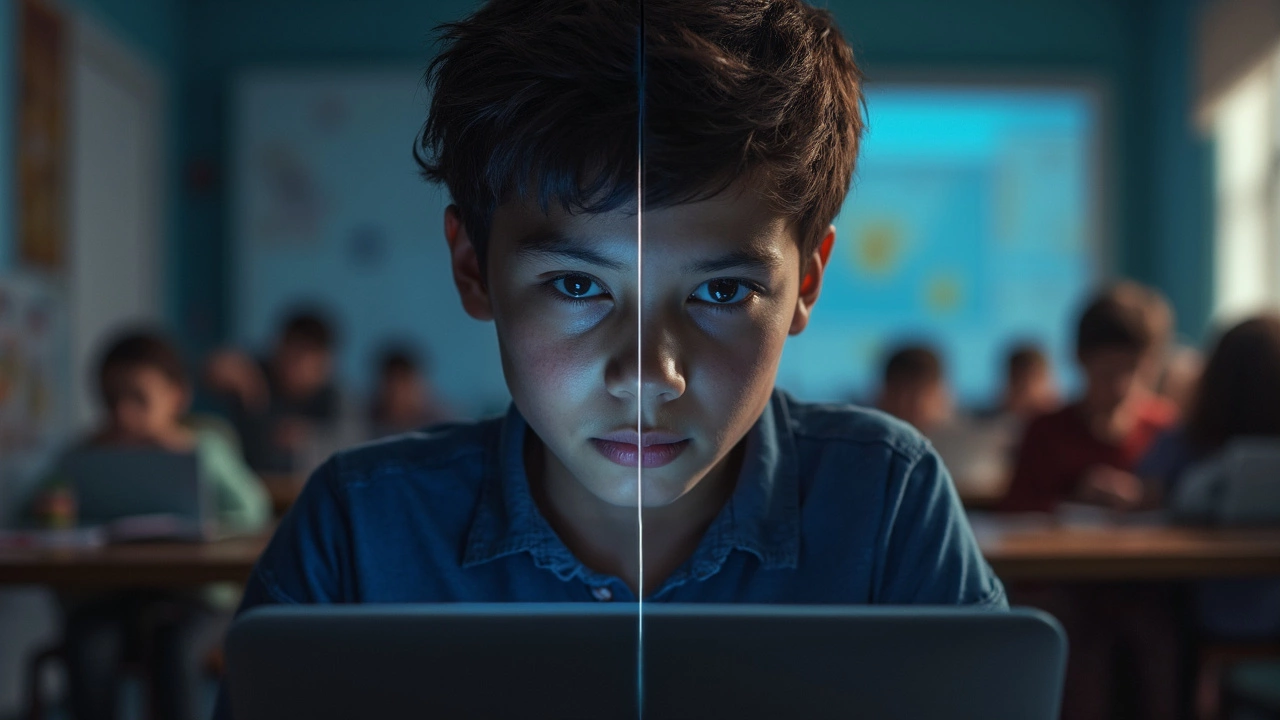Feeling like everything is shifting online these days? You're not alone. With online schools ringing the new norm, it's worth asking: how's this all shaking up our mental health?
Let's start with the big one—flexibility. Being able to attend classes in your PJs sounds amazing, right? No mad dashes to catch the bus, and you get to tailor your day more to your liking. That freedom can really ease stress for some, making life feel less like a hectic marathon.
But on the flip side, that lack of structure can throw others for a loop. Without a set schedule to stick to, it's easy to feel adrift and lose that motivation mojo. Striking that balance between flexibility and routine is key.
Then there's the social side. Sure, you might miss those random chats in the school hallway, but online school's opened doors to a whole new way of connecting. Virtual study groups, discussion boards, and video calls are all part of the mix now. Yet, for some, it might also feel a bit... isolating. Humans are social creatures—finding ways to stay connected is important to keep those feelings of loneliness at bay.
- Flexibility vs. Structure
- Social Connections and Isolation
- Screen Time Impacts
- Tips for a Healthier Online School Experience
- Finding the Balance
Flexibility vs. Structure
One of the major perks of online school is the freedom to mold your schedule. A solid 70% of students report they love being able to work at their own pace, especially those who tend to feel the heat in a traditional classroom setup. Not having the pressure of a fixed timetable can reduce stress and allow for personal exploration.
Freedom to Customize
When you call the shots, you can sync your study times with when you learn best. Are you a night owl or a morning lark? With digital education, it's your choice. Plus, squeezing in family time or other interests becomes more doable—huge win for mental health.
The Risk of Losing Focus
But hey, don’t toss structure out the window just yet. Studies show that too much freedom can sometimes lead to procrastination. Without a natural rhythm to the day, people might end up doing more Netflix marathons than math problems.
Creating a structured schedule is like having a roadmap. Simple things like setting alarms, using calendar apps, or rewarding yourself after ticking items off the to-do list can keep things on track.
- Set specific study hours.
- Prioritize tasks with daily lists.
- Include breaks to prevent burnout.
- Stick to a routine as if you were heading to campus.
The Balance Strategy
Finding a happy medium between flexibility and structure is all about balance. For instance, some students swear by the “Pomodoro Technique,” where you study hard for 25 minutes and kick back for 5 minutes. Research suggests this boosts concentration and fight back fatigue. So, while online schooling offers more personal freedom, a sprinkle of discipline helps keep your ship steady.
Social Connections and Isolation
So what's the deal with social connections when it comes to online school? Let's be real: it can be a mixed bag. For starters, there's no denying that face-to-face interaction takes a hit. Virtual classrooms aren't quite the same as sitting next to someone in chemistry or catching up during lunch breaks. The potential for isolation racks up quickly.
But here's the flip side—virtual learning opens up new avenues. You've got discussion forums, chat groups, and video calls. These tools can help forge bonds you might not have made otherwise, especially if you're less outgoing in person. Still, it's crucial to recognize that not everyone thrives in digital social scenes.
Why Isolation Happens
A big factor is that humans kinda need that in-person vibe. We're wired for it! Studies have shown that without physical presence, some cues and nuances of communication get lost. It can lead to misunderstandings or feelings of disconnect.
Also, depending on the layout of online classes, some students might feel like they're speaking into a void. Do teachers notice them? Are they even paying attention? That ambiguity can lead to feelings of being invisible.
Ways to Stay Connected
But don't worry—there are practical ways to beat the isolation blues:
- Join a virtual club or interest group. It's an awesome way to chat with people who share your passions.
- Set up regular video calls with classmates to discuss class topics or just hang out. Keeping up face time helps a ton.
- Don't hesitate to reach out to instructors—they're there to help! Most teachers are eager to engage and support their students, even online.
- If you can, mix in some in-person meet-ups with friends (following health guidelines, of course). That blend of online and offline can strike a nice balance.
Ultimately, finding your groove with social connections in an online school environment is about trying out what works best for you, adjusting as needed, and being proactive. Remember, everyone’s figuring this out, so don’t be shy about experimenting with new ways to connect!

Screen Time Impacts
We all know that too much screen time isn't exactly a new concern, but with online school, it's shot up to the top of many parents' worry lists. Staring at screens for hours isn't just about tired eyes. It can have a spillover effect on our mental health too.
Here's a simple fact: excessive screen time can mess with our sleep. Yeah, that blue light from screens? It can trick your brain into thinking it's daytime, messing up your sleep cycle. Lacking a good night's sleep can make anyone feel cranky and less focused the next day.
"Excess screen exposure can lead to heightened anxiety and depression among students," says Dr. Linda Smith, a psychologist who studies technology's impact on youth.
Now, I'm not saying screens are all bad—far from it. But moderation is key. Finding ways to break up that screen time with real-world activities can really help reset your headspace.
Making Screen Time Healthier
- 20-20-20 Rule: For every 20 minutes of screen time, look at something 20 feet away for 20 seconds. Simple, but effective.
- Tech-free zones: Set up specific areas in your home where screens are off-limits. Like, no phones at the dinner table!
- Wind down routine: Limit screen exposure at least an hour before bed to help your brain prepare for sleep.
To give you an idea of how this looks, check out this table detailing recommended screen time by age:
| Age | Recommended Max Daily Screen Time |
|---|---|
| 6-12 | 1-2 hours |
| 13-17 | 2-3 hours |
Ultimately, being aware of how screen time affects us and making conscious choices can help keep the balance, making distance learning a win-win for our brains.
Tips for a Healthier Online School Experience
So, how do we nail down a healthier vibe while juggling online school? It's all about finding that sweet spot between work, play, and everything in between. Whether you're a student or helping one, these tips can make a real difference.
1. Craft Your Workspace
First things first, set up a dedicated study spot. A comfy chair, a clean desk, and good lighting can change the whole game. Keeping your space distraction-free makes it easier to concentrate and give your brain that 'I'm in school' signal.
2. Structure Your Day
Missing that school bell? Get in the habit of creating a daily schedule. Block out time for classes, study, meals, and breaks. Breaks are like the magic sauce—they help recharge so you're not feeling fried half the time.
3. Stay Connected
Feeling isolated? You’re not alone. Make time to chat with classmates or friends, even if it's a quick video call. As Dr. Kelly Clarkson (not the singer) says,
"Social interactions are crucial for mental health and should be an integral part of distance learning."
4. Move More, Sit Less
Sitting for hours? Your body will thank you for moving around. Set reminders to stand up, stretch, or walk. Keeping your body active helps keep your mind sharp.
5. Set Boundaries
When home becomes the classroom, it's easy for lines to blur. Set clear boundaries—knock off at a certain time and step away from the screen. This helps separate study from chill time, giving your brain a break.
6. Limit Screen Time
It's tempting to plug in non-stop, but zoning out from social media and tech for a bit can do wonders. Schedule tech-free time regularly to give your mind a breather.
7. Listen to Your Needs
Always tune in to how you're feeling. If you're feeling overwhelmed, it’s okay to reach out for help. Talking things over with someone can help ease stress and keep mental health on track.
8. Keep a Routine
Even weekends can use a bit of routine. Sticking to a consistent sleep and wake time helps regulate your body's clock, so you're more alert and ready for those online classes!

Finding the Balance
Striking a balance between the perks and downsides of online school can be a bit of a juggling act. But don't worry, we've got some tips that can help you make the most of your virtual learning experience without losing your cool.
Set a Realistic Schedule
First things first, come up with a schedule that's realistic. Structure your day so you’re not burning out, and be sure to set specific times for studying, breaks, and even a bit of fun. A routine can keep you grounded.
Divide your tasks into smaller chunks and tackle them one at a time, instead of getting overwhelmed by looking at the big picture. This ‘chunking' method helps reduce anxiety and keeps you moving along.
Create a Dedicated Learning Space
Find a spot that’s all yours. Having a dedicated space for learning can make it easier for you to switch into 'school mode' when it’s time to hit the books. Plus, it helps keep distractions at bay, giving you a personal space to focus.
Stay Connected
Keep the human interaction alive. Ever heard of virtual coffee breaks? They’re a fun way to catch up with friends or classmates during scheduled breaks. Engage in online discussions, drop by virtual study groups, or even just stay active in class chats. Staying connected can make the virtual world feel a little less isolating.
Manage Screen Time
Avoid the trap of endless screen time by setting limits. It’s not just about cutting down; it’s about swapping screen time with 'dream time' or offline activities. Dive into hobbies, grab a book, or walk outside. Balance is your best friend here.
Keep Mental Health in Check
Mental health isn’t just about surviving, it’s about thriving. Regularly check in with yourself. Feeling stressed? Mindfulness apps, deep breathing exercises, or a simple meditation can work wonders. If it’s feeling like too much, it’s okay to reach out for support—it’s always better to chat it out than bottle it up.
The magic lies in finding what works best for you. It might take some experimenting but stay open to trying out different strategies until you hit the sweet spot. After all, the goal is to make distance learning work for your well-being, not against it.






